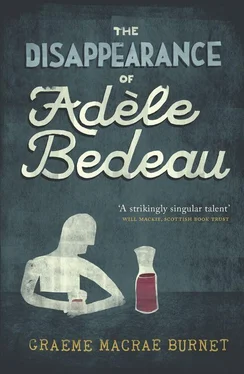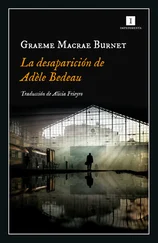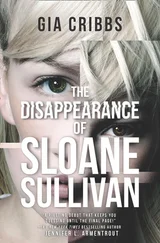Graeme Macrae Burnet
The Disappearance of Adèle Bedeau
IT WAS AN EVENING like any other at the Restaurant de la Cloche. Behind the counter, the proprietor, Pasteur, had poured himself a pastis , an indication that no more meals would be served and that any further service would be provided by his wife, Marie, and the waitress, Adèle. It was nine o’clock.
Manfred Baumann was at his usual place by the bar. Lemerre, Petit and Cloutier sat around the table by the door, the day’s newspapers folded in a pile between them. On their table was a carafe of red wine, three tumblers, two packets of cigarettes, an ashtray and Lemerre’s reading glasses. They would share three carafes before the night was out. Pasteur opened his newspaper on the counter and leaned over it on his elbows. He was developing a bald patch, which he attempted to disguise by combing back his hair. Marie busied herself sorting cutlery.
Adèle served coffee to the two remaining diners and began wiping the waxcloths of the other tables, pushing the crumbs onto the floor that she would later sweep. Manfred observed her. His place was not exactly at the bar, but at the hatch through which food was brought from the kitchen. He continually had to adjust his position to allow the staff to pass, but nobody ever thought to ask him to move. From his post he could survey the restaurant and strangers often mistook him for the proprietor.
Adèle was wearing a short black skirt and a white blouse. Around her waist was a little apron with a pocket in which she kept a notebook for taking orders and the cloth she used for wiping tables. She was a dark, heavy-set girl with a wide behind and large, weighty breasts. She had full lips, an olive complexion and brown eyes, which she habitually kept trained on the floor. Her features were too heavy to be described as pretty, but there was an earthy magnetism about her, a magnetism no doubt amplified by the drabness of the surroundings.
As she leant over the unoccupied tables, Manfred turned towards the counter and, in the mirror above the bar, watched her skirt inch up her thighs. She was wearing tan tights with white ankle socks and black pumps. The three men at the table by the door also observed her; undoubtedly, Manfred imagined, harbouring similar thoughts to his own.
Adèle was nineteen years old and had been working at the Restaurant de la Cloche for five or six months. She was a sullen girl, reluctant to engage in conversation with the regulars, yet Manfred was sure she enjoyed their attention. She kept her blouse loosely fastened, so that it was often possible to see the lace edging of her brassiere. If she did not wish them to stare, why dress in such a provocative manner?
All the same, when she turned towards the bar, Manfred averted his eyes.
Pasteur was staring at an article in the middle pages of L’Alsace. There was a crisis in Lebanon.
‘Bloody Arabs,’ said Manfred.
Pasteur gave a little snort through his nose to acknowledge the remark. He was not one to engage in controversial discussions over the bar. His duties were limited to pouring drinks and issuing bills. He regarded waiting tables as beneath his dignity. Such chores, along with the dispensing of pleasantries, were left to Marie and Adèle or whoever else was working. Manfred, for his part, had no particular opinion on the situation in the Middle East. He had made the remark only because he had thought it was sort of thing Pasteur might have said, or which would at least have met with his approval. Manfred was quite happy with Pasteur’s unwillingness to engage in chit-chat. When he did pass a remark now and again, it tended to fall flat and it was a relief not to feel obliged to make conversation.
At the table by the door, Lemerre, a barber whose shop was not far from the restaurant, was holding forth on the subject of the milking cycle of dairy cows. He was explaining at some length how the yield could be increased merely by milking the cattle at shorter intervals. Cloutier, who had been brought up on a farm, attempted to interject that any gains made by such a measure were lost in the long term by shortening the milk-bearing life of the cows. Lemerre shook his head vigorously and made a gesture with his hand to quieten his companion.
‘A common misconception,’ he said, before continuing with his lecture. Cloutier stared at the table and fidgeted with the stem of his glass. Lemerre was a corpulent man in his early fifties. He was wearing a burgundy V-neck sweater over a black polo neck. His trousers were hiked halfway up his belly and secured with a thin leather belt. His hair, which Manfred assumed he dyed, was jet black and combed back from his forehead, revealing a pronounced widow’s peak. Petit and Cloutier were both married, but they rarely made reference to their wives and when they did so it was always in the same deprecating terms. Lemerre had never married. ‘I don’t believe in keeping animals in the house,’ was his customary explanation.
From outside, the Restaurant de la Cloche of Saint-Louis was an unremarkable place. The pale yellow render on the exterior walls was stained and chipped. The sign on the wall above the windows was unenticing, but the restaurant’s central location made promotion redundant. The door to the restaurant was on a corner adjacent to a car park in which the town’s weekly market was held. On the wall next to the door was a blackboard on which the day’s specials were written, and above this a small balcony with an ornate wrought iron balustrade. The balcony belonged to the apartment in which Pasteur and his wife lived. Inside, the restaurant was surprisingly spacious. The decor was unpretentious. Two wide pillars divided the room, informally separating the dining area on the right of the door from the tables by the window where locals dropped in during the day for a quick glass, or spent the evening drinking and exchanging views on the contents of the day’s newspapers. The dining area was furnished with fifteen or so rickety wooden tables covered with brightly coloured waxcloths and set with cutlery and tumblers. On the wall behind the counter, partially obscured by a glass shelf of liqueur bottles, was a large mirror advertising Alsace beer, its art deco lettering chipped and barely legible in places. This mirror created the illusion that the restaurant was bigger than it was. It also gave the place an air of faded grandeur. Marie often grumbled that it looked shabby, but Pasteur insisted that it gave the place charm. ‘We’re not running a Paris bistro,’ was his habitual response to any suggestion of upgrading. On the wall to the right of the counter were the doors to the toilets, flanked by two hulking dark wood dressers used to store cutlery, glasses and crockery. The dressers had been there as long as anyone could remember. Certainly they predated Pasteur’s ownership of the establishment.
Manfred Baumann was thirty-six years old. He was dressed tonight, as he was every night, in a black suit and white shirt with a tie loosened at the neck. His dark hair was neatly cut and parted to one side. He was a good-looking man, but his eyes shifted nervously as if he was trying to avoid eye contact. Consequently, people often felt ill at ease in his company and this served to reinforce his own awkwardness. Once a month, on Wednesday afternoon when the bank where he worked was closed, Manfred went to Lemerre’s shop to have his hair cut. Without fail Lemerre asked him what he would like done and Manfred would reply, ‘The usual’. As he cut Manfred’s hair, Lemerre engaged in small talk about the weather or uncontroversial subjects from the day’s papers and when Manfred left, he would bid him goodbye with the phrase ‘Until Thursday’.
Yet not three hours later, Lemerre would be sitting at his table with Petit and Cloutier and Manfred would be standing at his place at the counter of the Restaurant de la Cloche. They would acknowledge each other, but no more so than if they were strangers happening to make eye contact. On Thursdays, however, Manfred was invited to join the three men in the weekly game of bridge. Manfred did not particularly enjoy playing cards and the atmosphere was invariably strained. It seemed to Manfred that his presence at their table made the others uncomfortable, yet to turn down their invitation would be interpreted as a snub. The tradition had begun three years previously after the death of Le Fevre. The Thursday after the funeral the three friends were short of a man to make up their four and asked Manfred to join them. He was aware that he was simply filling the dead man’s shoes, and Lemerre’s customary farewell of ‘Until Thursday’ made it clear that he was not welcome to join them on other evenings.
Читать дальше












